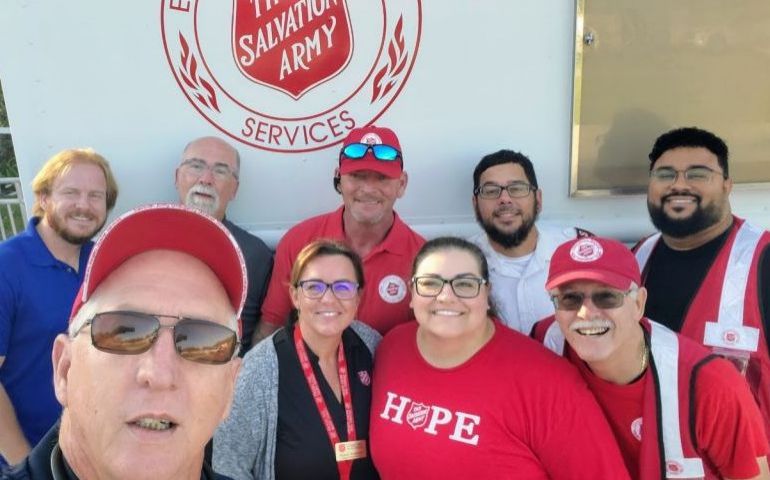Dreamteam, Words Matter, Legacy to Leadership, Transitional Thoughts
Sarah Schmitt | michelle.hartfield@uss.salvationarmy.org | (678) 485-4745

Lakeland, FL (October 24, 2024)-
In any organization, any team, any individual - any one providing emotional and spiritual care to survivors, advocacy, speaking to colleagues, leadership, volunteers, stakeholders - words matter. When William and Catherine Booth abandoned the traditional concept of a church pulpit in East London in 1865, they started The Salvation Army.
In the United States, The Salvation Army has more than 62,000 employees and more than 3 million volunteers. More than 120 countries get help from the Salvation Army, which is a religious and charitable organization.
A legacy is something you leave behind. Leaving a legacy can take many forms, your faith, ethics, and core values... you can leave a legacy with money or assets... you can leave a legacy with character, reputation, and how you live - setting an example and guiding others. A legacy of leadership can be seen through generations of corps officers, familial mottos, and acts of service.
The impact Incident Commanders have on their teams builds legacy and fortitude to keep individuals motivated to volunteer to be deployed in emergency disasters. In his current position, Steve Vicks leads with “understanding, respect, listening to everyone on the team with all levels of experience, and demonstrating expertise level engagement, passing on knowledge and bringing best practices forward.” "team feels safe, and they're operating with support and direction", "would volunteer for service right away"-building a legacy.
Leadership - the heart of a servant leader makes all the difference in how teams respond, collaborate, and perform. A successful alliance in teamwork depends on effective communication. It is important to treat all team members with dignity and respect, regardless of their position." Supporting change, growth, guidance, and support for others is key to leading volunteers. In line with servant leadership, this approach emphasizes service over status.
In communities, the Salvation Army promotes and nurtures communal relationships before, during, and after life's storms. To serve those in greatest need, words are essential to express need, understanding, and compassion.
As a result of Hurricane Milton, the Incident Management Assistance Team in Lakeland, FL served 40,971 meals, 3,858 meal boxes, 17,390 drinks, 8,252 snacks, creating connection, community, planting seeds of hope, creating opportunities of legacy, and giving back to others.
There are currently nine people on the Lakeland, FL Incident Command Team, which serves three counties. Over 400 hours have been spent in the last four days as a small, but mighty team. They follow the motto "all hands on deck" and "no one left behind" and adhere to the message "Hope Is On The Way" whenever a need arises.
A small team can make a big difference. The Salvation Army utilizes the talents of those who have a calling to give their time, effort, and energy to the greater good.
In speaking of his team, Steve Vicks says, "...everyone has given their all and produced results that were unimaginable.". In short, they have done God's work.” With over 30 years of emergency management experience, Steve notes that this is one of his best teams, noting that he "would serve with them again, any time!”.
Volunteers are inspired by the words of leaders. It encourages employees to strive for success. Individuals in an organization represent themselves to those they interact with through acts that generate responses, move into recovery mode, and integrate resources in order to promote the betterment of the community through lacing words and presentation.
For more than 100 years, The Salvation Army has provided assistance to victims of natural disasters and other emergencies throughout the United States. Disaster survivors and rescue workers can always count on Salvation Army mobile feeding units and teams of trained disaster workers for help, hope, and healing throughout the year.
Preparedness is the first phase of the Emergency Management Cycle. The same way that individuals and families should prepare for potential dangers and threats, disaster workers should also take part in training courses. Designed for adult learners, the courses emphasize cooperative learning and group interaction. A variety of training courses are available, including classes on incident management, canteen operations, food service, emotional and spiritual support, as well as basic first aid and CPR procedures.
The difficulty level of disaster training courses is determined by the complexity of the knowledge presented in the course. Prerequisites may also be required for certain courses.
For upcoming classes, dates, and course descriptions, please select your location.
You can register for a class by logging into your account. If you do not have an account, create one now https://disaster.salvationarmyusa.org/train.php
About The Salvation ArmyThe Salvation Army annually helps more than 30 million Americans overcome poverty, addiction, and economic hardships through a range of social services. By providing food for the hungry, emergency relief for disaster survivors, rehabilitation for those suffering from drug and alcohol abuse, and clothing and shelter for people in need, The Salvation Army is doing the most good at 7,600 centers of operation around the country. In the first-ever listing of “America’s Favorite Charities” by The Chronicle of Philanthropy, The Salvation Army ranked as the country’s largest privately funded, direct-service nonprofit. For more information, visit www.SalvationArmyUSA.org. Follow us on Twitter @SalvationArmyUS and #DoingTheMostGood.